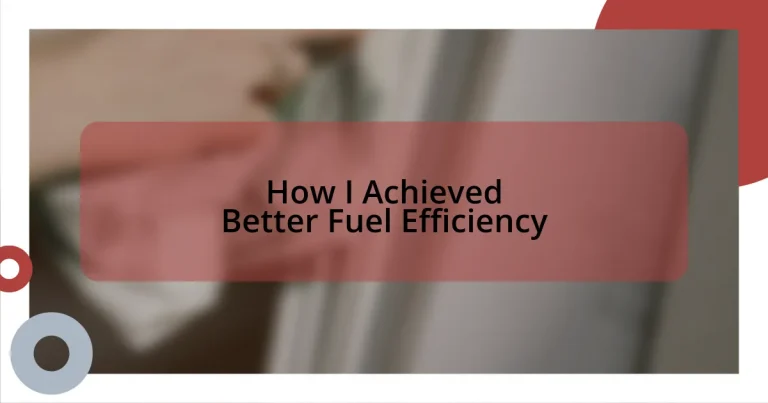Key takeaways:
- Driving habits significantly impact fuel efficiency; slowing down and anticipating traffic can lead to fuel savings.
- Regular vehicle maintenance, including proper tire pressure, timely oil changes, and clean air filters, is crucial for optimizing fuel economy.
- Using technology like OBD-II scanners and mobile apps helps monitor vehicle performance and identify fuel-wasting habits.
- Tracking fuel efficiency through logs and sharing progress with others fosters motivation and encourages better driving practices.
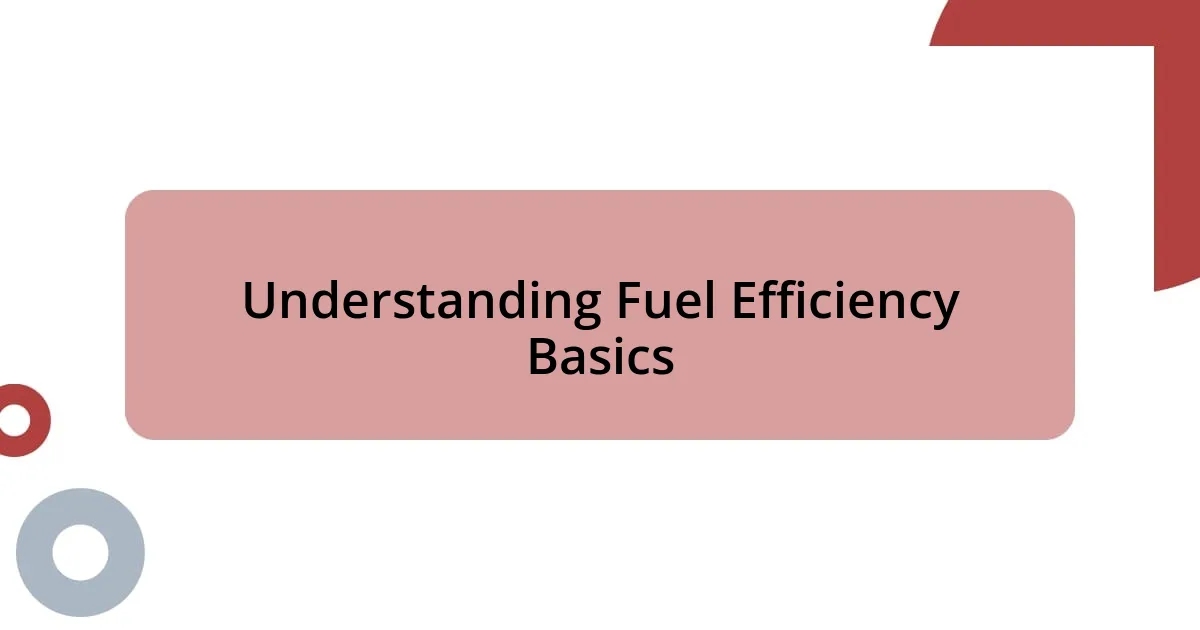
Understanding Fuel Efficiency Basics
Fuel efficiency is all about how effectively a vehicle converts fuel into distance traveled. When I first started tracking my mileage, I was shocked to realize how much difference small changes could make. Have you ever wondered what simple habit could save you a few bucks at the pump?
One of the most surprising aspects I discovered was that driving habits play a crucial role in fuel efficiency. For instance, I used to speed up just to hit a red light – that was a real eye-opener for me. Slowing down can significantly enhance your fuel economy, making it not only safer but also more economical.
Another fundamental concept is understanding how your vehicle’s condition affects fuel efficiency. I remember a time when my car’s tire pressure was low, and I had no idea it was dragging down my fuel economy. Keeping tires properly inflated is a simple yet often overlooked practice that can lead to noticeable improvements. Do you keep an eye on your vehicle’s maintenance? It really can make a world of difference!
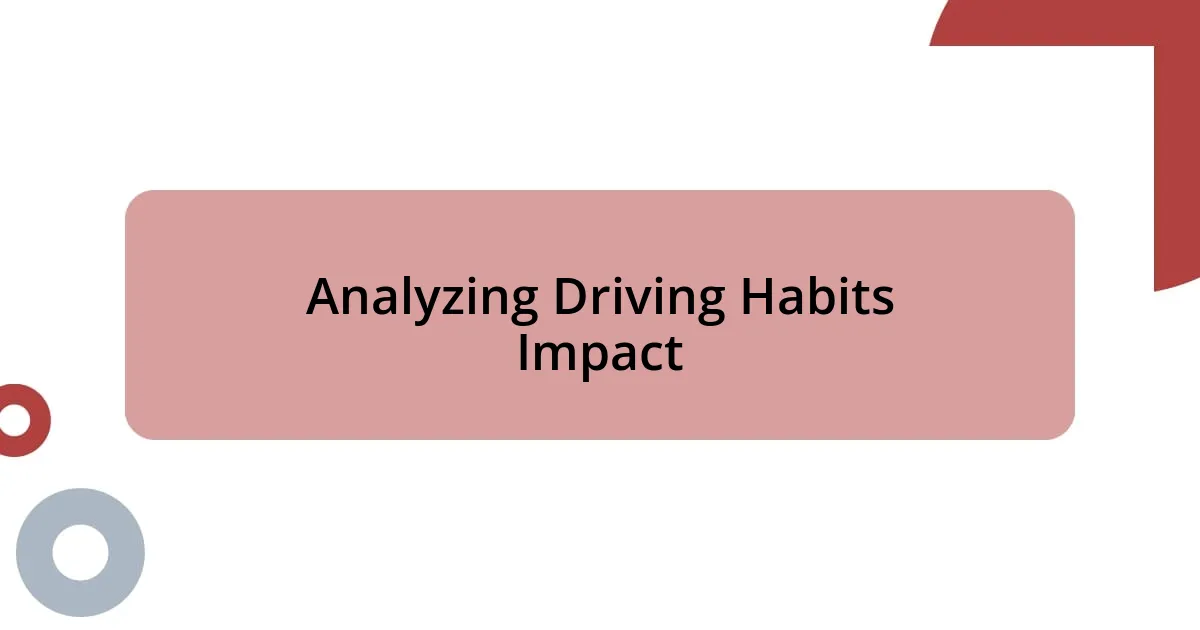
Analyzing Driving Habits Impact
Analyzing my driving habits revealed fascinating insights about fuel efficiency. For a long time, I was convinced that accelerating quickly would get me where I needed to go faster. However, I soon realized that aggressive driving often leads to increased fuel consumption. When I switched to a more relaxed driving style, I actually felt less stressed and noticed my fuel gauge needed refilling less often. It’s a win-win!
One habit that drastically improved my fuel efficiency was anticipating traffic. I used to zoom towards a stop sign, only to slam the brakes at the last minute. Now, I focus on scanning the road ahead, which allows me to save on gas by coasting rather than braking suddenly. It’s amazing how this small change shifted my mindset on the road – driving became less about rushing and more about enjoying the journey. Have you ever thought about how your driving rhythm affects your vehicle’s performance?
Lastly, I began to analyze my regular routes and adjust them for better fuel efficiency. For example, taking a scenic back road instead of the main highway might add a few minutes but saves me fuel because of fewer stops and slower traffic. I was surprised to see how enjoyable my trips became, not to mention the money saved at the pump! Sometimes, it’s worth examining not just how we drive, but where we drive.
| Driving Habit | Fuel Efficiency Impact |
|---|---|
| Quick Accelerations | Decreases efficiency |
| Anticipating Stops | Increases efficiency |
| Route Management | Can increase efficiency |
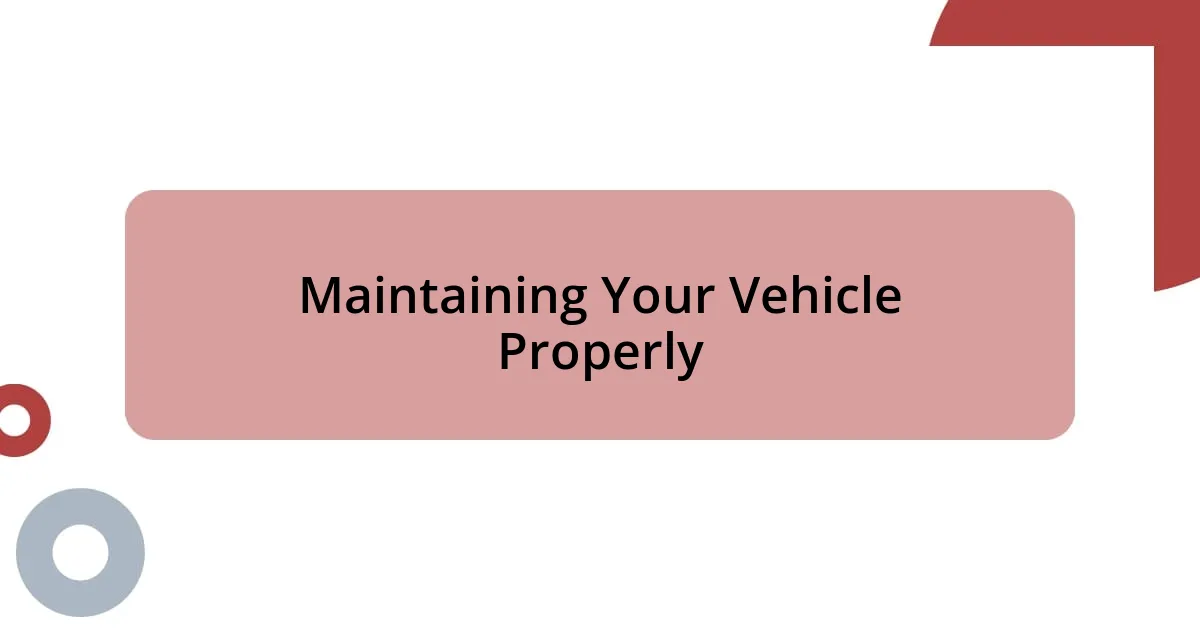
Maintaining Your Vehicle Properly
Keeping my vehicle well-maintained was one of those “aha” moments I didn’t expect could influence my fuel efficiency so much. I remember the time I ignored a simple yet crucial oil change and noticed my engine struggling afterward. It was a wake-up call; regular maintenance isn’t just about the engine running smoothly—it actively contributes to better fuel economy.
Here are key maintenance tips that have helped me maximize my vehicle’s efficiency:
- Check Tire Pressure Regularly: Properly inflated tires reduce rolling resistance. I found that maintaining the right pressure made my car feel lighter and more responsive.
- Change the Oil on Schedule: Fresh oil aids engine performance. After my routine oil change, I could genuinely feel how much smoother the engine ran, almost like a breath of fresh air for my car.
- Replace Air Filters: A clean air filter can improve acceleration and fuel economy. When I swapped mine out, I noticed improved throttle response, making drives much more enjoyable.
- Inspect Fuel Injectors: Clogged injectors can harm combustion efficiency. I once had a technician clean mine, and the difference in power and fuel consumption was astounding.
These practices have transformed my driving experience, proving that a little effort goes a long way in preserving fuel. Every time I get behind the wheel, that sense of knowing I’m maximizing my vehicle’s potential keeps me motivated to maintain these habits.
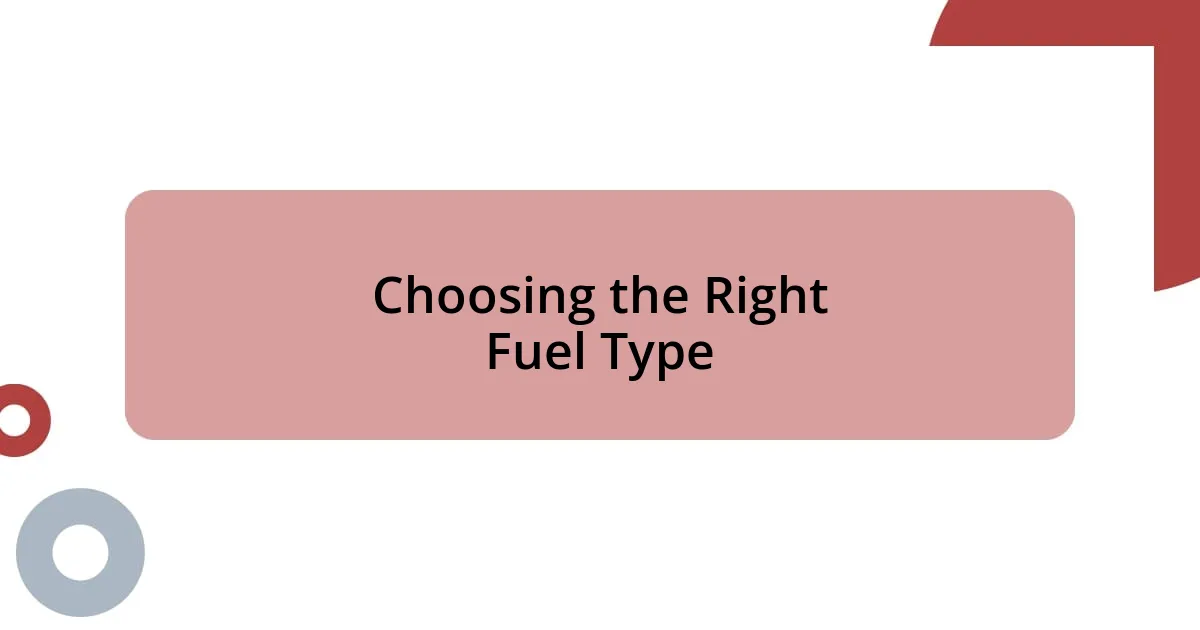
Choosing the Right Fuel Type
Choosing the right fuel type for my vehicle was a game-changer in my quest for better fuel efficiency. Initially, I stuck with the standard gasoline, thinking it was enough. But when I learned that my car performed better with premium fuel, I decided to give it a try. The difference in both performance and fuel economy was palpable. Have you ever felt the smoothness of your engine just by choosing high-quality fuel? It truly made my drives more enjoyable.
I remember the moment I discovered the significance of octane ratings. It’s easy to overlook, but fuel with a higher octane rating can prevent knocking in the engine, allowing it to run more efficiently. After switching, I noticed not only an increase in power but also a decrease in the frequency of my fuel stops. It felt fantastic to know that I was getting the most out of every dollar spent on gas. How often do we consider what fuel we’re putting into our tanks? Small changes can lead to substantial improvements.
Additionally, I learned about alternative fuels that align with my values and boost efficiency. I once tried a biofuel blend, and not only did my car respond well, but I also felt good about using a cleaner option. It was fulfilling to know that I was minimizing my carbon footprint, even in this small way. Have you explored any eco-friendly fuel options? Finding the right fuel can be both beneficial for your vehicle and the planet, making it a win-win decision.
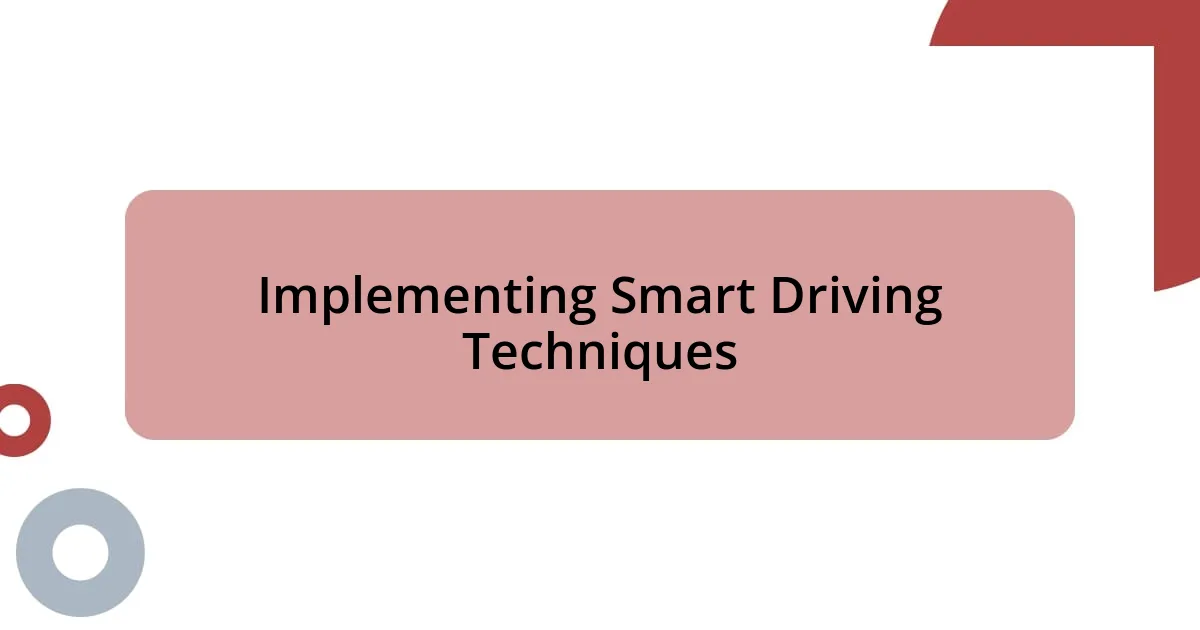
Implementing Smart Driving Techniques
Implementing smart driving techniques has been a true turning point for me in achieving better fuel efficiency. One of the first adjustments I made was to embrace smooth acceleration and braking. I remember one particularly tense drive—after a stressful day at work—where I discovered that calming my driving style not only reduced my fuel consumption but also made for a more pleasant driving experience. Have you ever noticed how relaxing your grip on the wheel can ease the entire journey?
Another technique I adopted was maintaining a steady speed. There was a moment during a long road trip when I consciously avoided rapid lane changes and instead focused on cruising steadily. Believe me, the drop in fuel usage was astonishing. It’s incredible how simply using cruise control on the highway can take the strain off the engine and keep things efficient. How often do we think about the impact of our driving habits on fuel efficiency?
Lastly, I became aware of my car’s load. Initially, I didn’t think much of the items I kept in the trunk, but after a few explorative weekends, I realized the unnecessary weight was like dragging an anchor. Removing that extra gear wasn’t just good for my gas mileage; it also lightened my car physically and intuitively. Have you checked your own vehicle for excess weight? Small changes in how we drive and what we carry can truly lead to fuel savings.
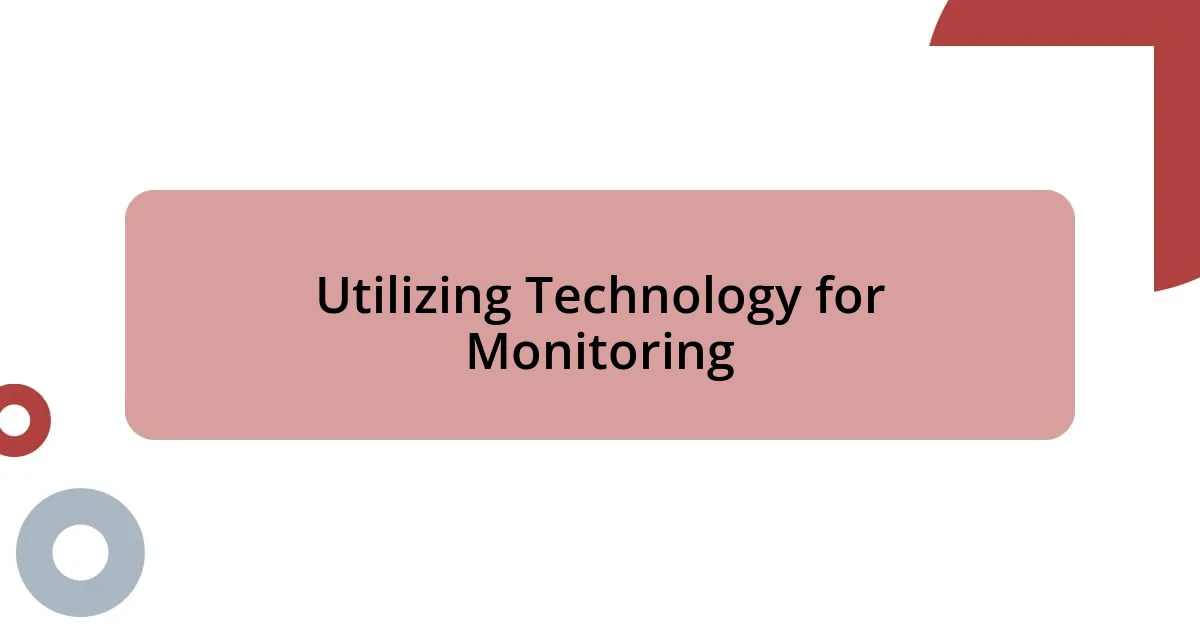
Utilizing Technology for Monitoring
Utilizing technology for monitoring my vehicle’s performance has transformed my approach to fuel efficiency. I started using an OBD-II scanner, which plugs into my car’s diagnostic port. The first time I checked the data, I was amazed to see real-time readings of my fuel consumption and engine performance. Have you ever wondered exactly what your car is doing under the hood? The detailed insights helped me identify issues before they became major problems, allowing me to maintain peak efficiency.
In a quest to refine my strategies, I also experimented with mobile apps that track my driving habits. I remember one week in particular, where I noticed that my fuel efficiency dipped significantly during work commutes. By reviewing the app’s feedback, I realized my frequent stops for traffic lights were costing me dearly. It struck me that technology can be an honest partner in your fuel-saving journey—did you know that even minor route adjustments could make a difference?
Additionally, I tailored my maintenance schedule using alerts from my car’s monitoring system. One time, after receiving a notification about tire pressure, I checked and found my tires were under-inflated. The moment I corrected that, I could feel the difference in handling and fuel economy. How often do we overlook such details, assuming everything is fine? Technology not only provides information; it empowers us as drivers to take control and make informed changes that lead to more efficient journeys.
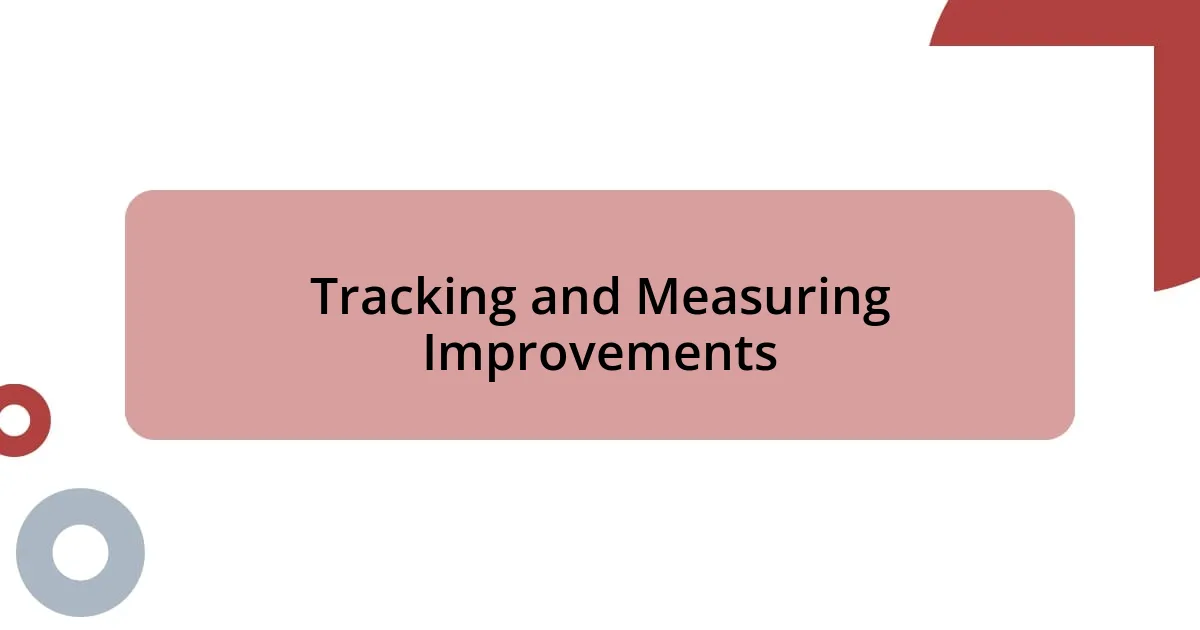
Tracking and Measuring Improvements
Tracking and measuring my fuel efficiency improvements has been an essential part of my journey. I once decided to keep a simple log of my fuel purchases, noting the mileage each time I filled up. What I discovered was eye-opening: a few adjustments led to measurable gains in fuel economy, and seeing those numbers in black and white motivated me to keep refining my habits. Have you considered how keeping a fuel journal could change your perspective on your driving patterns?
Another strategy I adopted was using a spreadsheet to chart my miles per gallon (MPG) over time. I remember the thrill of seeing my MPG gradually rise after implementing minor changes in my driving style. It felt rewarding, almost like a personal victory, to have this tangible evidence of my progress. It’s interesting how data points can spark motivation—what would knowing your MPG trends reveal about your driving habits?
Finally, sharing these metrics with friends and family helped me stay accountable. When I told my buddy about my latest fuel-saving strategies, he jumped on board and started his own tracking. Creative banter about our progress created a friendly competition that made the journey fun and engaging. Have you ever thought about how community support can amplify your commitment to improving fuel efficiency? It’s amazing how many small improvements can add up when you’re tracking and measuring them!












